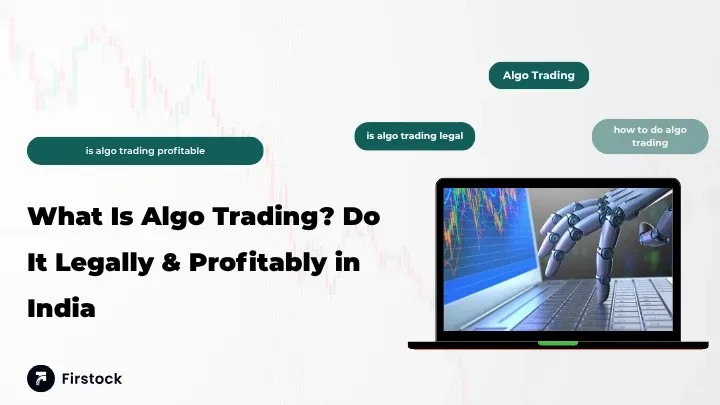What Is Algo Trading? Do It Legally & Profitably in India

What Is Algo Trading? A Complete Beginner’s Guide
In today’s fast-moving financial markets, where prices change every second, executing trades quickly and accurately has become crucial. This is where Algo Trading — or Algorithmic Trading — steps in.
But what is algo trading, really?
In simple terms, it’s the use of computer programs and algorithms to place trades automatically based on predefined conditions such as price, timing, or quantity — without human intervention.
This guide explains everything beginners should know about algorithmic trading, how it works, whether it’s legal in India, and what makes it both powerful and risky.
⚠️ Disclaimer: This article is for educational purposes only. Algorithmic trading involves financial risk and should be approached only after proper learning and understanding.
What Is Algo Trading?
Algorithmic Trading (or Algo Trading) refers to a process where a computer executes trading orders using a set of predefined rules. These rules are based on mathematical models, price movements, indicators, and market data.
Instead of a human manually placing a trade, the algorithm monitors the market and automatically executes the trade when certain conditions are met.
Example
Let’s say a trader creates a rule:
“Buy 100 shares of TCS if the price drops by 2% within 10 minutes.”
Once the algorithm detects that condition, it places the trade instantly — faster than a human could react.
In short, algo trading eliminates emotional decisions and brings speed, discipline, and precision to the trading process.
How Does Algo Trading Work?
Algo trading relies on four main components:
- Strategy – The trading logic or condition (e.g., buy when moving average crosses above 50-day average).
- Coding – Writing the strategy into an algorithm using programming languages like Python, C++, or specialized APIs.
- Backtesting – Testing the strategy on historical data to check how it would have performed.
- Execution – The algorithm executes orders automatically when real-time conditions match the strategy.
Most brokers and platforms — including Firstock, a SEBI-registered trading app — offer APIs and automation tools for traders to develop, test, and execute such strategies seamlessly.
⚠️ Disclaimer: Algorithmic execution doesn’t guarantee profits. Even well-tested strategies can fail during volatile or unpredictable market conditions.
Types of Algo Trading Strategies
Algo trading can be used for multiple purposes depending on a trader’s goals. Some of the most common strategies include:
Each strategy has different levels of complexity, data requirements, and risk exposure.
How to Do Algo Trading (Step-by-Step Overview)
In case you are figuring out how to do algo trading, here is an educational roadmap that has been simplified:
Step 1: Learn the Basics
Markets working principles, trading indicators and price action behavior are the main things you should understand.
Step 2: Choose a Reliable Platform
Pick a broker registered with SEBI that supports API, based or algorithmic execution.
Firstock offers a perfect environment for real, time data, algo integration and backtesting.
Step 3: Build or Select a Strategy
Either of the following is possible:
Develop a logical market based algorithm by yourself, or
Use the pre-built models available from brokers or third, party developers.
Step 4: Backtest Your Strategy
Simulate the market in the past by using historical market data to check how your strategy would have performed.
Step 5: Deploy and Monitor
It is a good idea to always supervise the operations, slippage and risk, even if everything goes great with the strategy. The best ones also have to be changed from time to time due to market dynamics.
Disclaimer: Algo trading is a technically demanding activity and requires market knowledge and risk management skills. It is advisable that novices only trade with virtual money until they gain sufficient experience.
Is Algo Trading Profitable?
This is one of the most frequently asked questions — is algo trading profitable?
The short answer: It can be, but not always.
Profitability depends on several factors:
- Quality of strategy
- Market volatility
- Execution speed
- Backtesting accuracy
- Transaction costs and slippage
By algorithmic trading, institutional traders and hedge funds which are well equipped technologically, get faster execution and have large datasets are able to make a consistent profit.
On the other hand, retail traders can be profitable through the gaining of experience, optimization of strategies, and risk discipline.
Warning: Algorithmic trading might cause heavy losses if the design is not proper or the management is not good. Past performance should not be taken as a guarantee of future results.
Is Algorithmic Trading Legal in India?
Yes, Algo Trading is legal in India and is under the supervision of the Securities and Exchange Board of India (SEBI).
Despite that, very strict rules are imposed:
Only brokers registered with SEBI are allowed to provide algorithmic or API, based trading services.
Each algorithmic strategy needs to receive the exchange's green light before implementation.
Brokers ought to guarantee that there is no harm being done to the market; that risks are being checked and that there is no lack of fairness.
So, although algo trading is a legal activity, it is performed in a regulated environment to ensure that the market remains fair and stable.
Important: Using unauthorized or unapproved algos is against the law. Be sure to use regulated brokers and SEBI, compliant platforms only.
Benefits of Algorithmic Trading
Speed and Accuracy: In a very short time (in fact within milliseconds) trades are executed this cannot be done manually.
No Emotional Bias: The decision, making process is free of fear or greed influences.
Continuous Monitoring: There can be multiple markets that are scanned at the same time by programs.
Backtesting: There is a possibility to test the strategy before using it in the live market.
Discipline: Guarantees that the trader will follow the same data, driven approach rather than yielding to emotions.
Such a huge popularity of algorithmic systems has made them integral tools in the present global financial markets.
The Risks and Issues Associated with Algorithmic Trading
The efficiency that is yielded by algorithmic trading comes at the price of certain risks that are of different nature than those of non algorithmic trading.
Technical Failures: Losses of a large scale may be brought about by an interruption of an internet connection or the occurrence of a bug in software.
Over- Optimization: A strategy that yields very good results during backtesting might perform poorly in the actual market.
High Volatility Risk: If stop, loss mechanisms are not implemented correctly, rapid price changes can cause heavy losses.
Infrastructure Investment: There are certain costs that have to be borne in order to have efficient and reliable servers, data feeds, and APIs.
Warning: Algorithmic trading exposes the traders to market, technical, and operational risks. Always do extensive testing prior to going live.
India's Algo Trading Market: A Brief Introduction
Algorithmic trading in India contributes more than half of the total market turnovers at major exchanges such as the NSE.
Consequently, institutional investors, proprietary trading firms, as well as retail investors are employing algorithmic means, reranging from simple rule, based trading to sophisticated AI, powered models, to execute their trades.
The Indian market regulatory framework not only guarantees transparency and openness but also allows retail traders to get involved by utilizing the services of brokers who provide certified APIs and automation functionalities.
Most Commonly Used Tools and Technologies in Algo Trading
Programming Languages: Python, R, C++, Java
Libraries: Pandas, NumPy, TA, Lib for analytics
Data Sources: Real, time APIs, historical databases
Order Execution Platforms: Broker APIs (e.g. Firstock API), FIX protocols
Cloud & VPS Servers: For non, stop operations
The selection of instruments is determined by the trader's expertise, complexity of the strategy, and the requirements of infrastructure.
Backtesting and Optimization
Backtesting is an absolutely necessary step in algorithmic trading it gives the opportunity to test the strategy on historical data prior to putting in real money.
Nevertheless, it is very important not to fall into the trap of "curve fitting" i.e. creating a strategy that yields perfect results on past data but fails in real conditions.
Optimization should be implemented for the strategy to be robust and flexible rather than flawless.
Ethical and Regulatory Considerations
Although very efficient, algorithmic trading can eventually lead to market instability if proper monitoring is not in place.
Rules that are given by SEBI facilitate:
- Risk checks prior to trading
- Order throttling limits
- Strategy and software approval
- Brokers and traders transparency
Such steps contribute not only to the safety of the securities markets but also to the fair competition among the different market players.
Warning: In case of use of non regulated software or performing manipulative trading activities, SEBI may take legal action against you.
Conclusion: The Future of Algorithmic Trading
Algorithmic trading is at the forefront of the technology that has reshaped the worldwide capital markets. They are now faster, smarter, and more data, centric. Getting to know what is an algo trading, how it works and the attendant risks is the very first step for any trader who wants to venture into this field.
Technology keeps leading the way and the access is getting wider day after day by day. In India, platform like Firstock are the place where traders can be empowered to explore algorithmic solutions in a responsible manner, regulated by the authorities.
Last Disclaimer: Algorithmic trading is a multifaceted, risky endeavor. It is important that you start with a small investment, keep learning, and obey SEBI rules.
FAQs on Algo Trading
1. What is Algo Trading in simple words?
Algo trading involves the use of computer programs that execute trades automatically based on a set of rules that are already defined. It removes human emotion and increases the speed of transactions.
2. Is Algo Trading profitable for individuals?
Yes, it is a good source of profit if one has a good strategy. However, outcomes will always depend on thorough research, market conditions, and good risk management.
3. Is Algo Trading legal in India?
It is legal for sure. On the condition of the regulated framework, SEBI gives the green light to Algo trading. It is allowed only for users with permitted and verified exchange algorithms.
4. How can I start Algo Trading in India?
By opening a trading account with a broker registered in SEBI and which supports algorithmic trading through API is the first step that you will have to take. After that, acquire some knowledge on programming and start trading with your small backtested strategies.
5. Do I need to know coding to do Algo Trading?
Certainly not. Some brokers provide no, code or low, code services that suit entry, level users, while professional traders use Python or other languages.
6. What are the risks of Algo Trading?
If not handled correctly, technical errors, inefficient strategies, and usage of leverage may result in losses of money.





